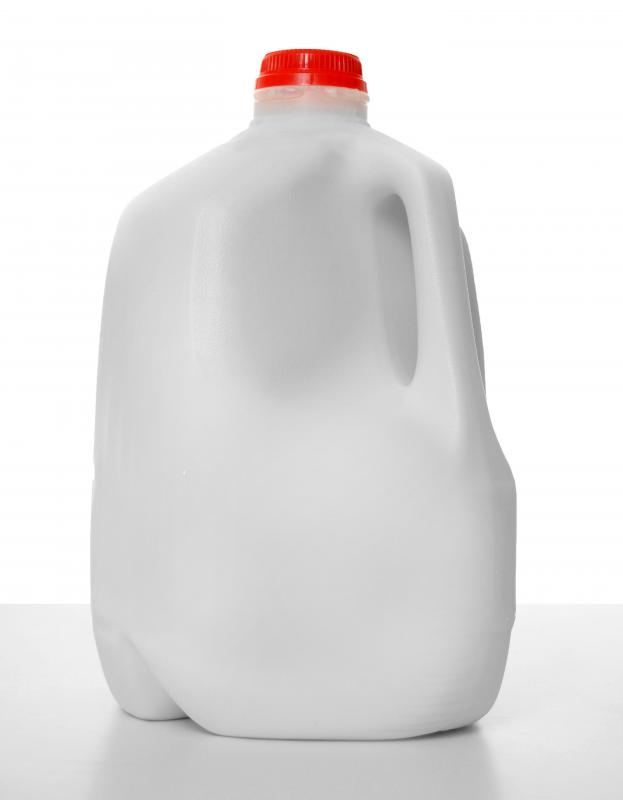At TheHealthBoard, we're committed to delivering accurate, trustworthy information. Our expert-authored content is rigorously fact-checked and sourced from credible authorities. Discover how we uphold the highest standards in providing you with reliable knowledge.
What is Lactose?
Lactose is a type of sugar that is found in milk and milk products, including human milk. Also called milk sugar, it is not found naturally in any other food. This sugar is made of carbon, hydrogen and oxygen, and it has the chemical formula of C12H22O11. By the time they are adults, many people become unable to digest milk sugar, which is a condition called lactose intolerance.
Concentration in Milk

The quantity of lactose in milk can vary by the type of animal as well as the individual animal or person. Human milk generally has a higher percentage — usually about 7% to 9%, by weight — than milk from animals does. Milk from cows, goats and sheep, for example, typically are less than 5% lactose by weight. For most processed dairy milk, the lower fat content, the higher the percentage of milk sugar there is in it.
Found in Other Dairy Products

This sugar is found to various degrees in other dairy products, such as cheese, butter or margarine, yogurt, whey and powdered milk. There is very little of it in cheese, butter and margarine. Whey, powdered milk and condensed milk, however, contain a very high percentage of this sugar — 50% or more, in some cases. The milk sugar content of yogurt can vary but generally is about 2% to 6%.
Use in Other Products

Lactose is often added to prepared foods to prevent caking or as a coating. This sugar is almost tasteless, so it also makes for an ideal filler in bread and other baked goods, including cereals, pancakes and cookies. It also is commonly added to canned and frozen vegetables to prevent discoloration. The type of milk from which this sugar is extracted can vary by country or region, with that of cows, goats and camels being the most common.

Some milk sugar also can be found in many ready-to-eat powdered products, such as dehydrated potatoes, soups and meal-replacement supplements. Foods that are labeled non-dairy, including coffee creamers, might also contain it in the form of whey or dry milk solids. It also can be found in some salad dressings, protein supplements, candy and processed meats.
Use in Medications

Lactose also is used in many over-the-counter and prescription drugs as a filler or coating. This includes pills such as chewable acid reflux treatments, birth control pills and throat lozenges. Although the amount of milk sugar in a single pill is hardly enough to affect most people, people who are intolerant of it should talk to their doctors before starting any new medication. People who suffer from diabetes also should limit or control its intake.
Intolerance

In a normal person, lactase, an enzyme produced by the small intestine, breaks down milk sugar. This allows it to be absorbed into the bloodstream. People who are lactose intolerant do not produce enough lactase and are therefore unable to process milk sugar.
As a rule, mammals lose their ability to digest milk sugar as they get older. Humans have undergone a mutation that allows them to retain a 10% capacity to produce lactase. This is normally enough to allow humans to digest milk and dairy products. Some people, however, don't retain this capacity and become intolerant of milk sugar. When someone who has this condition drinks milk or consumes products that contain more than a little lactose, they might experience symptoms such as bloating, cramps, nausea, flatulence and diarrhea.
AS FEATURED ON:
AS FEATURED ON:

















Discussion Comments
Are you sure it's just lactose because I get gas/flatulence when I eat cheeseburgers and drink whole milk. But when I drink 2 percent milk, I get no gas/flatulence at all. Maybe it's the milk fat that is causing gas?
I developed an intolerance to lactose in my early twenties. I am okay with one yogurt a day and some cheese (not too much). I do drink lactose free milk, which tastes the same as milk with lactose, because lactose has no flavor. I also from time to time buy lactose free ice cream, which again tastes the same and the texture is also the same.
I use lactose free ice cream and milk because I have emphysema and this seems to cut back on the phlegm that wants to accumulate in my lungs. Up until now, I have always been a milk drinker with no problems, but I'm 83 and lactose seems to cause this problem in my lungs. Do you know about this?
You can buy milk for cats without any lactose in it. why don't intolerant people just drink that.
if you are lactose intolerant you shouldn't drink any animal milk. Goat's milk would make no difference.
So basically if you eat too much lactose and you are lactose intolerant, you will become very gassy and possibly explode?
Just kidding, but would you pass gas or burp a lot?
I have had difficulty with lactose since my early twenties but I now use Disolact drops to convert my milk and capsules when I eat dairy products. I'm happy to say I feel great and rarely have problems!
can lactose kill you if you have too much?
Dear WG, I understand all dairy products contain lactose, would you tell me, how can lactose intolarent person digest goats milk? How exactely goats milk differ to cows milk (lactose wise) ?
Post your comments